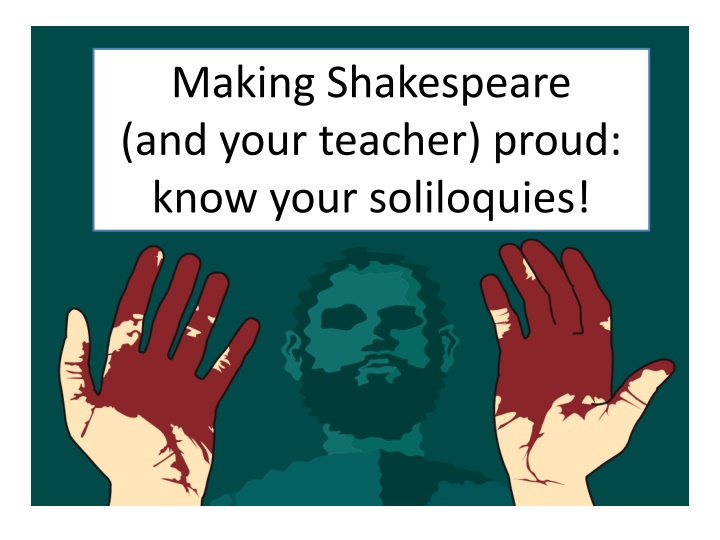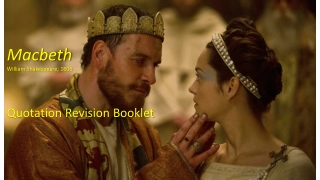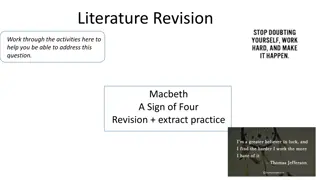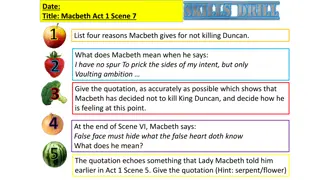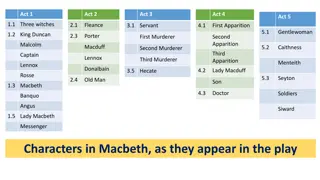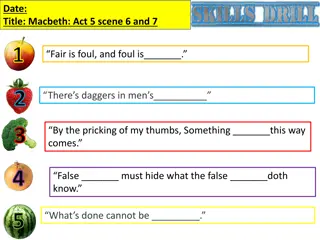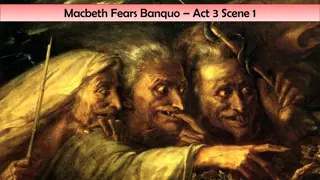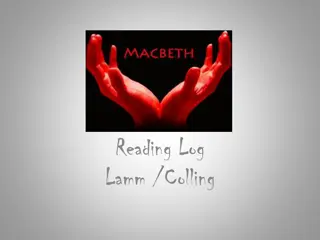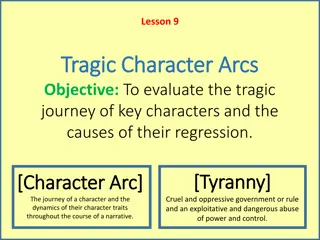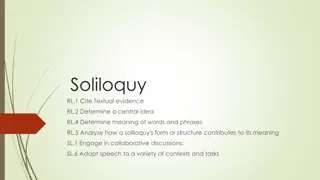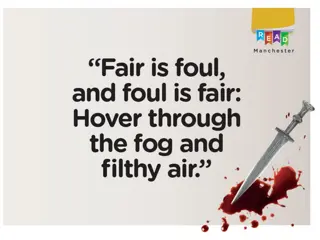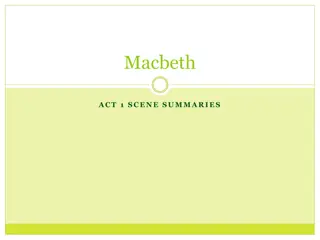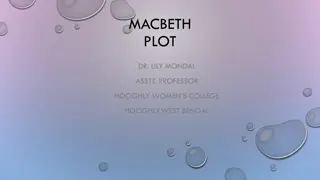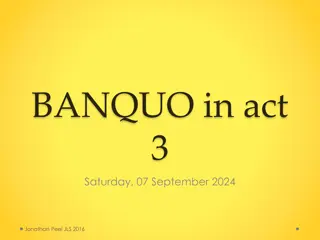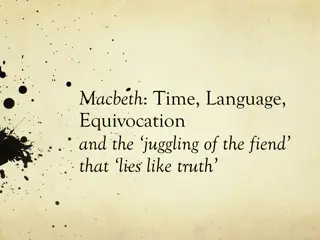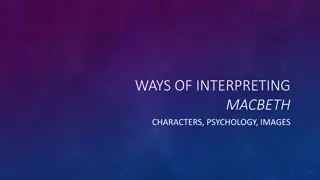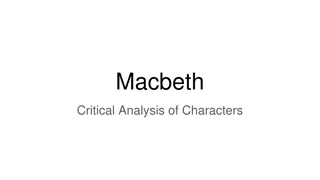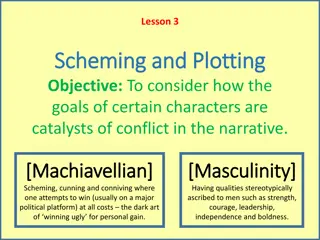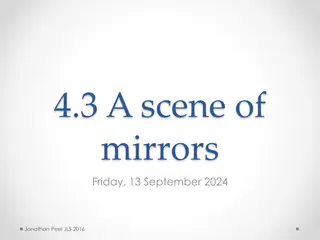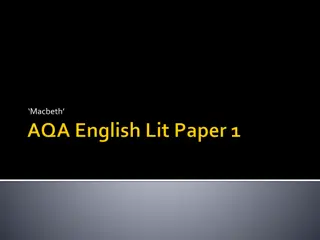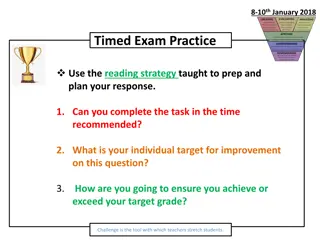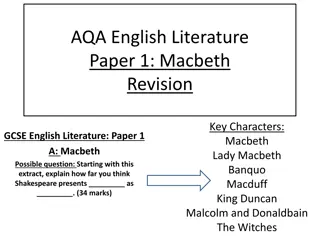Macbeth's Soliloquies and Development
Macbeth, initially a brave and noble man, faces moral dilemmas as he confronts themes of ambition, appearance vs. reality, and the supernatural through his seven soliloquies. Follow his character evolution and moments of introspection as he navigates the consequences of his actions spurred by prophecies and external influences.
Download Presentation

Please find below an Image/Link to download the presentation.
The content on the website is provided AS IS for your information and personal use only. It may not be sold, licensed, or shared on other websites without obtaining consent from the author.If you encounter any issues during the download, it is possible that the publisher has removed the file from their server.
You are allowed to download the files provided on this website for personal or commercial use, subject to the condition that they are used lawfully. All files are the property of their respective owners.
The content on the website is provided AS IS for your information and personal use only. It may not be sold, licensed, or shared on other websites without obtaining consent from the author.
E N D
Presentation Transcript
Making Shakespeare (and your teacher) proud: know your soliloquies!
What is a Soliloquy? Let s remember that a soliloquy is a very particular type of speech, different from a monologue and longer than an aside. A soliloquy is NOT the same thing as a monologue.
What is a Soliloquy? A soliloquy is a lengthy speech in which a character usually alone on stage expresses his or her thoughts to the audience.
What is an Aside? An aside is a brief remark by a character revealing his thoughts or feelings to the audience, unheard by the other characters
What is a Monologue? A monologue, like a soliloquy, is a lengthy speech. However, a monologue is addressed to other characters on stage, not to the audience.
Pun A play on words that sound alike, but have different meanings. e.g Did you hear about the sleeping man who got run over by a car? He was tired and exhausted!
Oxymoron Two juxtaposed words that mean opposite things. e.g: sweet sorrow, damned saint , honourable villain , jumbo shrimp.
Dramatic Irony The audience knows something the characters do not know. e.g: We know the killer is in the closet, but the soon-to-be victim does not.
Macbeths soliloquies There s 7 of them He goes through developments of character andmoments where the themes of ambition, appearance vs reality and thesupernatural shine through.
Macbeth in the beginning First viewed as a brave and noble man. He has morals and knows rights from wrong and is able to choose right. As he is forced into action, by his wife and the what he reads as prophesies, he looses his morals and his mind. This can be traced through his soliloquies.
Macbeth's First Soliloquy: Present Fears In Macbeth s first soliloquy, he is transfixed by fear. Macbeth's Soliloquy About the Witches and Prophecy Macbeth and Banquo have just been visited by three witches, who prophesise that Macbeth will become Thane of Cawdor and then King of Scotland. The witches also predict that the sons of Banquo will become kings in future. As the two men walk away, they are almost immediately met with a messenger who tells them that Macbeth has been given the title and lands belonging to the Thane of Cawdor. This news at first makes Macbeth happy, then terrifies him.
Truths Thane of Glamis, Thane of Cawdor Two truths are told, As happy prologues to the swelling act Of the imperial theme. This supernatural soliciting Cannot be ill, cannot be good: if ill, Why hath it given me earnest of success, Commencing in a truth? I am thane of Cawdor: If good, why do I yield to that suggestion Whose horrid image doth unfix my hair And make my seated heart knock at my ribs, Against the use of nature? Present fears Are less than horrible imaginings: My thought, whose murder yet is but fantastical, Shakes so my single state of man that function Is smother'd in surmise, and nothing is But what is not. -1.3 (240-255) Macbeth being King If these witches were bad, why would they tell me a truthful thing? Yield resign myself to something which would make me feel awful? Macbeth is the first to say murder he doesn t have to kill Duncan! Theme: appearance vs reality
A Brief Analysis of Macbeth's First Soliloquy In this soliloquy, Macbeth stands still and describes his fear in very dramatic terms. No one but the audience can hear him. During this soliloquy, Macbeth first voices the thought of murdering King Duncan. The thought frightens him, but he is drawn into his own ambitious imaginings - to the point where he loses touch with reality. He begins to be consumed by what is not in other words, that which does not really exist.
A Brief Analysis of Macbeth's First Soliloquy During this soliloquy, it is revealed that becoming King is the driving force behind Macbeth s ambition - and therefore his mental deterioration. At this point in the play, he has a conscience, he has morals and they are more important than ambition.
Macbeth's Second Soliloquy: Ambition, Greed, and Conflict In Macbeth's second soliloquy, he worries about the consequences of murder, and wonders if he really has the nerve to kill King Duncan. Macbeth's Soliloquy About Ambition Macbeth stands in a hallway, just outside where King Duncan and his men are at dinner. Macbeth contemplates the idea of murdering King Duncan and wrestles with his conscience. Macbeth knows that he should be protecting King Duncan, not planning to murder him. Macbeth is also very aware that he does not truly desire to kill, but he does have a fierce amount of ambition. That ambition, he concludes, may have some deadly consequences.
If it were done when 'tis done, then 'twere well It were done quickly: if the assassination Could trammel up the consequence, and catch With his surcease success; that but this blow Might be the be-all and the end-all here, But here, upon this bank and shoal of time, We'd jump the life to come. But in these cases We still have judgment here; that we but teach Bloody instructions, which, being taught, return To plague the inventor: this even-handed justice Commends the ingredients of our poison'd chalice To our own lips. He's here in double trust; First, as I am his kinsman and his subject, Strong both against the deed; then, as his host, Who should against his murderer shut the door, Not bear the knife myself. Besides, this Duncan Hath borne his faculties so meek, hath been So clear in his great office, that his virtues Will plead like angels, trumpet-tongued, against The deep damnation of his taking-off; And pity, like a naked new-born babe, Striding the blast, or heaven's cherubim, horsed Upon the sightless couriers of the air, Shall blow the horrid deed in every eye, That tears shall drown the wind. I have no spur To prick the sides of my intent, but only Vaulting ambition, which o'erleaps itself And falls on the other. - 1.7 (474-500) It glossing over the murder, demonstrating he is considering killing the King He comes up with many reasons why he should or shouldn t kill Duncan and ultimately comes to the conclusion that the only reason he would is ambition. At this point, Macbeth recognises his ambition and does not consider it a valid factor in deciding right from wrong.
A Brief Analysis of Macbeth's Second Soliloquy and Conflict The first several lines of the soliloquy are composed of Macbeth's desire to simply do the deed and get it over with - assuming that the murder would be an end in itself. However, Macbeth well knows that there will be long-reaching consequences, and that committing murder is not a simple task. https://youtu.be/JcI_xtsiUps
A Brief Analysis of Macbeth's Second Soliloquy and Conflict Macbeth is now thinking about murder, the idea no longer disgusts or upsets him. Before, murder wasn t an option for Macbeth, but now it is, because of his ambition to become King. At this point, Macbeth is still sane he also still has morals because he will not murder Duncan because the only reason to do this is ambition. Although he decides against murder, Macbeth s ambition is becoming more prominent because he is considering it.
Macbeth's Third Soliloquy: The Dagger Speech In Macbeth's third soliloquy, he sees a vision of an imaginary dagger. The hallucination strengthens Macbeth's resolve to commit murder. Macbeth's Soliloquy Before Killing King Duncan Macbeth, alone, envisions a bloody dagger dangling in front of him. The hallucination is a product of his mind. There is a pause here, in the action of the play, while Macbeth speaks aloud his inner thoughts. This verbalization of inner thoughts is a key point for all soliloquies.
Is this a dagger which I see before me, The handle toward my hand? Come, let me clutch thee. I have thee not, and yet I see thee still. Art thou not, fatal vision, sensible To feeling as to sight? or art thou but A dagger of the mind, a false creation, Proceeding from the heat-oppressed brain? I see thee yet, in form as palpable As this which now I draw. Thou marshall'st me the way that I was going; And such an instrument I was to use. Mine eyes are made the fools o' the other senses, Or else worth all the rest; I see thee still, And on thy blade and dudgeon gouts of blood, Which was not so before. There's no such thing: It is the bloody business which informs Thus to mine eyes. Now o'er the one halfworld Nature seems dead, and wicked dreams abuse The curtain'd sleep; witchcraft celebrates Pale Hecate's offerings, and wither'd murder, Alarum'd by his sentinel, the wolf, Whose howl's his watch, thus with his stealthy pace. With Tarquin's ravishing strides, towards his design Moves like a ghost. Thou sure and firm-set earth, Hear not my steps, which way they walk, for fear Thy very stones prate of my whereabout, And take the present horror from the time, Which now suits with it. Whiles I threat, he lives: Words to the heat of deeds too cold breath gives. [A bell rings] I go, and it is done; the bell invites me. Hear it not, Duncan; for it is a knell That summons thee to heaven or to hell. - 2.1 (612-643)
Brief Analysis of the Dagger Soliloquy The dagger symbolizes Macbeth's deep inner, dark desire to commit murder. It is dripping with blood, demonstrating the violence Macbeth both fears and desires. In this scene, Macbeth worries over his decision, and finally resolves to take action. This demonstrates a turning point in the development of his character. https://youtu.be/iOjf9S4alv0
Now, Macbeths character is moving awayfrom morality and more focused on his ambition. He has moved from contemplating murder to actually committing it. Macbeth chooses wrong over right because he wants to be King and his ambition is too great to not act on.
By now, Macbeth is deteriorating mentally he no longer thinks clearly and his having hallucinations. He is compelled to kill King Duncan by his own mind, in its distraught state. Macbeth is now beginning to experience paranoia and a skewed vision of reality.
However, Macbeth has not yet lost all of his morality, because he still feels some guilt. Despite this, the fact he kills Duncan shows his mental deterioration and ambition taking over his mind.
Macbeth's Fourth Soliloquy: Suspicion and Fear of Banquo In Macbeth's fourth soliloquy, Macbeth is acutely aware of the fact that he has no children. He recalls the prediction of the witches that Banquo's sons will be kings. Macbeth's Soliloquy Before Killing Banquo This is the point at which Macbeth decides to murder his own best friend. The witches have predicted that Banquo will be the father of many kings. Macbeth is distressed by this, because he knows that his own legacy will be barren. No children will inherit Macbeth's kingdom. Thus, he wears a fruitless crown.
To be thus is nothing; But to be safely thus. Our fears in Banquo Stick deep; and in his royalty of nature Reigns that which would be fear'd: 'tis much he dares; And, to that dauntless temper of his mind, He hath a wisdom that doth guide his valour To act in safety. There is none but he Whose being I do fear: and, under him, My Genius is rebuked; as, it is said, Mark Antony's was by Caesar. He chid the sisters When first they put the name of king upon me, And bade them speak to him: then prophet-like They hail'd him father to a line of kings: Upon my head they placed a fruitless crown, And put a barren sceptre in my gripe, Thence to be wrench'd with an unlineal hand, No son of mine succeeding. If 't be so, For Banquo's issue have I filed my mind; For them the gracious Duncan have I murder'd; Put rancours in the vessel of my peace Only for them; and mine eternal jewel Given to the common enemy of man, To make them kings, the seed of Banquo kings! Rather than so, come fate into the list. And champion me to the utterance! -3.1 (1056-1081) Macbeth is now King, which is what he originally wanted, but now he wants more. He decides there s no reason to be King is he has no security in the position. Macbeth feels lesser than Banquo and his lineage; all he can think about is the threat Banquo poses to him. The outright anger he feels is clear when considering what he has done to get the crown, only to have Banquo s family take it from him.
A Brief Analysis of Macbeth's Soliloquy on Banquo This soliloquy represents another turning point for the character of Macbeth. He admits that he has committed great acts of violence to become king. Now, he wonders if it all was worth it, if he will have no heirs. He is jealous of the fact that Banquo will be father to kings. Macbeth is also very worried that Banquo may become suspicious. In order to make sure that Banquo never reveals the truth of what Macbeth has done, Macbeth decides to kill his own best friend.
By now, Macbeth is no longer moral he fears Banquo and his actions are not held back by his conscience. Banquo was Macbeth s friend, Macbeth valued him, but not Macbeth no longer has the character to value friends. In Macbeth s mind, since Banquo is a threat to him and he is jealous, Banquo must go. Macbeth s mind has deteriorated greatly so much that he fears his friends are out to get him and he thinks everyone is an enemy.
Macbeth's Fifth Soliloquy: Macbeth the Tyrant King In Macbeth's fifth soliloquy, Macbeth entrenches himself even further in the bloody path that he has chosen. He swears never to hesitate again, no matter how intense the action may be that is required. Macbeth's Soliloquy About Murdering Macduff's Family Now, Macbeth decides that he will not hesitate on any action that he must take. This is quite different form his original crisis of conscience about killing King Duncan. In this speech, Macbeth directly states his intent to kill all the family of Lord Macduff.
Time, thou anticipatest my dread exploits: The flighty purpose never is o'ertook Unless the deed go with it; from this moment The very firstlings of my heart shall be The firstlings of my hand. And even now, To crown my thoughts with acts, be it thought and done: The castle of Macduff I will surprise; Seize upon Fife; give to the edge o' the sword His wife, his babes, and all unfortunate souls That trace him in his line. No boasting like a fool; This deed I'll do before this purpose cool. -4.1 (1724-1734)
A Brief Analysis of Macbeth's Tyrant Soliloquy The key point of this soliloquy is that it is very direct. Macbeth simply states that his first thoughts - the firstlings of his heart- will lead immediately to action without any hesitation. That is, they will also be the immediate actions of his hands. This is not only a change in character, but also a change in the manner of speech he uses. We don't know if Shakespeare did this on purpose, but it is interesting to contemplate.
Why is the killing of children so emotive? https://w ww.youtu be.com/w atch?v=1 m5gxQh5j eo
Macbeth's Sixth Soliloquy of Disillusionment In this soliloquy, Macbeth contemplates the deeper consequences of what he has done. He realises that he will never have the rewards of a well-lived life. Macbeth's Soliloquy: Sick at Heart and Hopeless This soliloquy comes as Macbeth faces the upcoming battle at his castle. His people have rebelled against him. Malcolm, the true king, is approaching. Macbeth is putting on his armour and preparing for war.
I am sick at heart, When I behold This push Will cheer me ever, or disseat me now. I have lived long enough: my way of life Is fall'n into the sear, the yellow leaf; And that which should accompany old age, As honour, love, obedience, troops of friends, I must not look to have; but, in their stead, Curses, not loud but deep, mouth-honour, breath, Which the poor heart would fain deny, and dare not. - 5.1 (2272-2278)
A Brief Analysis of Macbeth's Soliloquy of Disillusionment In this soliloquy, we see that Macbeth may now value things other than ambition. However, he feels it is too late for him to redeem himself. When he says "mouth- honour," he is talking about false words of praise that are given to him by his subjects. He knows that they do not respect or honour him. Macbeth realizes now, that he will not and cannot have the true rewards of friendship, respect, and genuine love. This is a moment of insight for him.
Macbeth's Seventh Soliloquy: Tomorrow and Tomorrow and Tomorrow This is the most famous of all Macbeth's soliloquies. In it, Macbeth expresses a deep sense of gloom. Macbeth's Tomorrow Soliloquy in Context This speech comes just after Macbeth learns that Lady Macbeth is dead. He speaks about the futility of all that he has done. Macbeth is grieving his wife. He is also sinking into a dark place of despair because of his former actions.
To-morrow, and to-morrow, and to-morrow, Creeps in this petty pace from day to day To the last syllable of recorded time, And all our yesterdays have lighted fools The way to dusty death. Out, out, brief candle! Life's but a walking shadow, a poor player That struts and frets his hour upon the stage And then is heard no more: it is a tale Told by an idiot, full of sound and fury, Signifying nothing -5.5 (2374-2385).
A Brief Analysis of Macbeth's Tomorrow Soliloquy The famous words "tomorrow, and tomorrow, and tomorrow" exemplify effective use of repetition to enhance a theme. The rest of the speech is about how futile, repetitive, and hopeless life seems to Macbeth. Beginning with a hopeless type of repetition only serves to underscore Macbeth's feeling of despair. https://youtu.be/i3p2HnNicug
Throughout Macbeths soliloquies we see his progression as a person. He becomes an ambitious man with no morals and his paranoia is brought to extremes. With a deadly mix of paranoia and ambition, Macbeth becomes a remorseless murderer. He goes through such a mental deterioration that can no longer be considered sane.
